Mainland and HK officials step up visits to the grassroots: Hope for lower-income Hong Kongers?
The Liaison Office of the Central People's Government in the Hong Kong Special Administrative Region or LOCPG has been busy engaging with Hong Kongers at the grassroots level, in order to connect with the ground. Officials of the Hong Kong government and the pro-Beijing camp have followed suit. Zaobao journalist Tai Hing Shing speaks to ordinary Hong Kongers and academics to get a sense of whether this strategy will help to further the Chinese Communist Party's people-centred governance ideal in Hong Kong society.
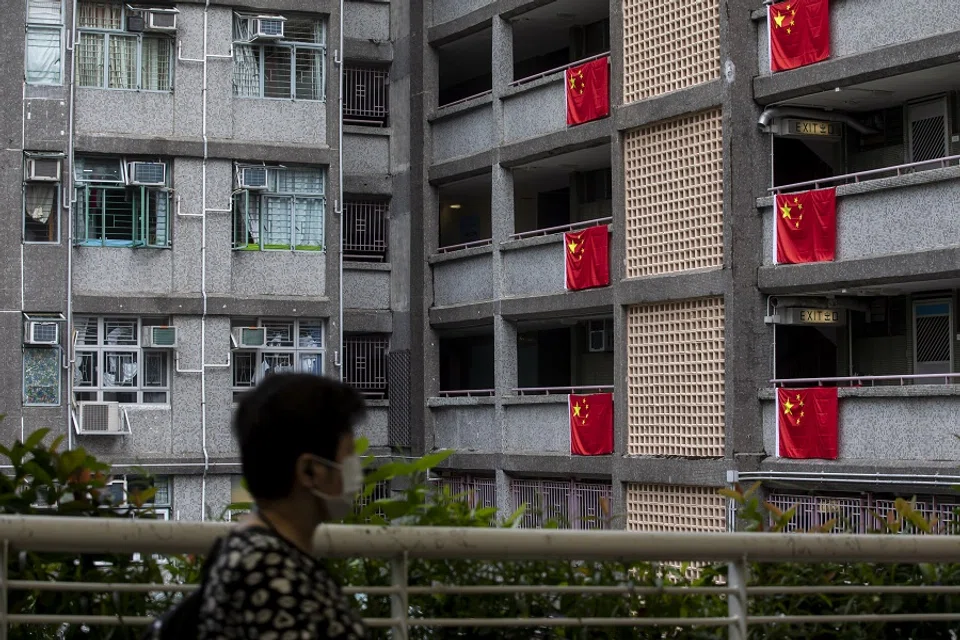
Hong Konger Mdm Wong, in her 30s, had a memorable National Day on 1 October, as she and her family had a personal visit from the number three official in the Hong Kong government - Financial Secretary Paul Chan.
Days after the visit, Mdm Wong could not hide her excitement when interviewed by Zaobao. She recalled that a few days before National Day, municipal worker Ma Yat-chiu, who often helped her, phoned her and asked if it would be convenient to arrange a visit on National Day. "I said no problem, but I thought it would be some municipal people. Who would have thought it was the financial secretary!"
Chan arrived at Mdm Wong's home at around 11am and stayed for about two hours, during which he asked at length about how Mdm Chan's son and daughter were doing at home and at school. He even stayed to wrap and eat dumplings with them.
"It is good that officials see the families on the ground, at least they will get to know the real problems on the ground, which will help them roll out measures to help the people." - Hong Konger Mdm Wong
Statistics show that about 200,000 people in Hong Kong live in subdivided flats and "cage homes". Mdm Wong is among them; her family of three live in Kwun Tong old district in a subdivided flat measuring about 100 square feet (about 10 square metres). While the space is small, the monthly rent is about HK$6,000 (S$1,047), which is about half of Mdm Wong's monthly pay, not including high utility costs.
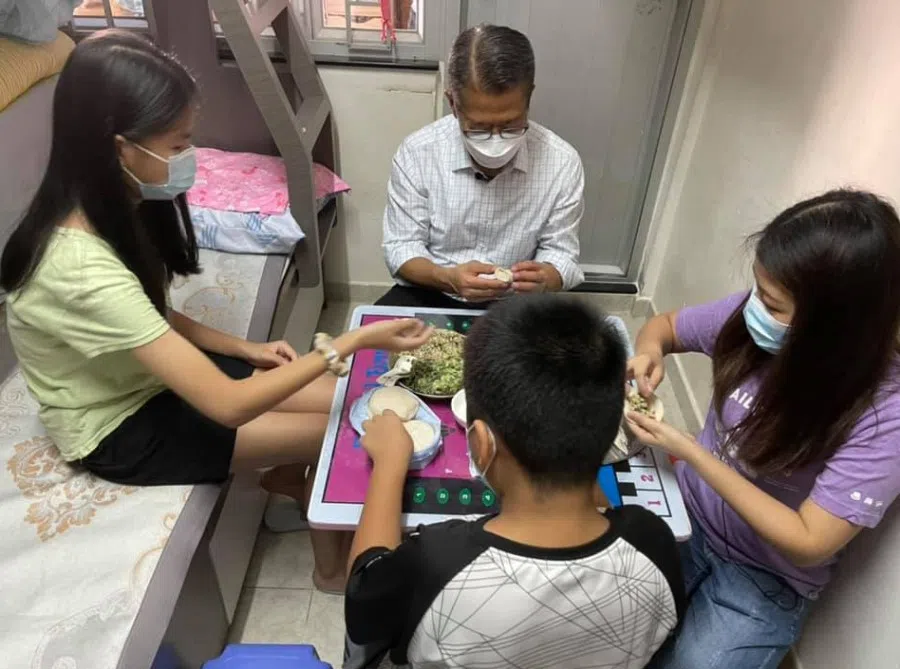
In the conversation with Chan, Mdm Wong gave a truthful account of her current situation, hoping the Hong Kong government could arrange for her family to move into public housing. She said, "This is the first time an official has visited my home, and hopefully there will be more in future. It is good that officials see the families on the ground, at least they will get to know the real problems on the ground, which will help them roll out measures to help the people."
Central government agency director's 'heart heavy' at seeing 'cage homes'
In the periods before and after China's recent National Day, from the Hong Kong Liaison Office (Liaison Office of the Central People's Government in the Hong Kong Special Administrative Region, LOCPG) to the Hong Kong government, many senior officials have embarked on a wave of ground visits and community service.
The first to do so was LOCPG director Luo Huining. On 30 September, he visited Hong Kong's fishermen, young entrepreneurs, residents, streetside stores, and cage home residents, to take in views from various segments of society.
The most prominent item on that day's schedule was Luo's pre-noon trip to Mongkok, where he visited some cage home residents; the space they lived in measured less than 19 square metres and was divided into four cages with a total of 11 beds for rent. This makes the per capita space less than two square metres.
Afterwards, the LOCPG news release quoted Luo saying his heart was heavy at seeing such cramped living conditions. "I'd heard of cage homes, but hearing about it is nothing like actually seeing it. It makes one's heart heavy that 200,000 people live like this."
The LOCPG is the top representative agency of the Chinese central government in Hong Kong. Its previous iteration was the New China News Agency (NCNA), established in 1947; two years after Hong Kong's return to China, the NCNA was officially called the LOCPG, and one of its tasks was to connect with various sectors in Hong Kong.
...in the past 20 years, many Hong Kongers have criticised the LOCPG for showing favouritism in only getting close with the business sector and ignoring the voices of the people on the ground.
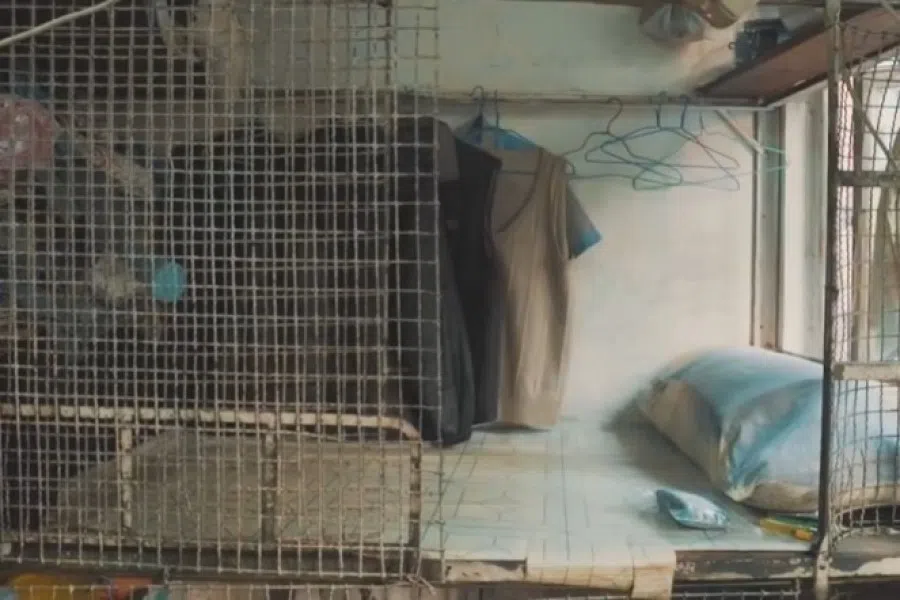
However, in the past 20 years, many Hong Kongers have criticised the LOCPG for showing favouritism in only getting close with the business sector and ignoring the voices of the people on the ground. During the anti-extradition protests in Hong Kong in 2019, more than once the LOCPG was surrounded by protestors.
Some analysts note that the above is actually not accurate. Since Hong Kong's return in 1997, the LOCPG has been in touch with various sectors of Hong Kong society, including the grassroots, and the LOCPG head has made multiple visits on the ground. For example, in February 2015, then LOCPG head Zhang Xiaoming visited the Yu Chun Keung Memorial Care & Attention Home to wish the elderly a happy Chinese New Year and distribute new year goodies, and get to know the situation of Hong Kong's charity organisations in providing elderly care services.
For two days in August 2017, the LOCPG website posted news of Zhang's visits to social enterprise restaurant Beihe Peer (北河同行) - where owner Chan Cheuk Ming was presented with a calligraphy work by Zhang - and to the family of the late Hong Kong volunteer Wong Fuk Wing, who lost his life in 2010, rescuing people from an orphanage following an earthquake in Yushu city in Qinghai province.
LOCPG grassroots activities will be the norm
In the year and a half that Luo has been LOCPG director, he has visited various districts a total of four times, including three previous visits: 17 February 2020 to China-funded companies in Hong Kong, as well as inspections to understand pandemic efforts, market supply, financial easing, and risk prevention; 28 February 2020 to the pandemic centre at Lei Yue Mun Park and Holiday Village; and 1 October 2020 to residents of subdivided flats.
However, if Zhang's few visits only highlighted that the LOCPG head is close to the ground, Luo's fourth round of visits on the eve of China's National Day this year carried a much clearer political message.
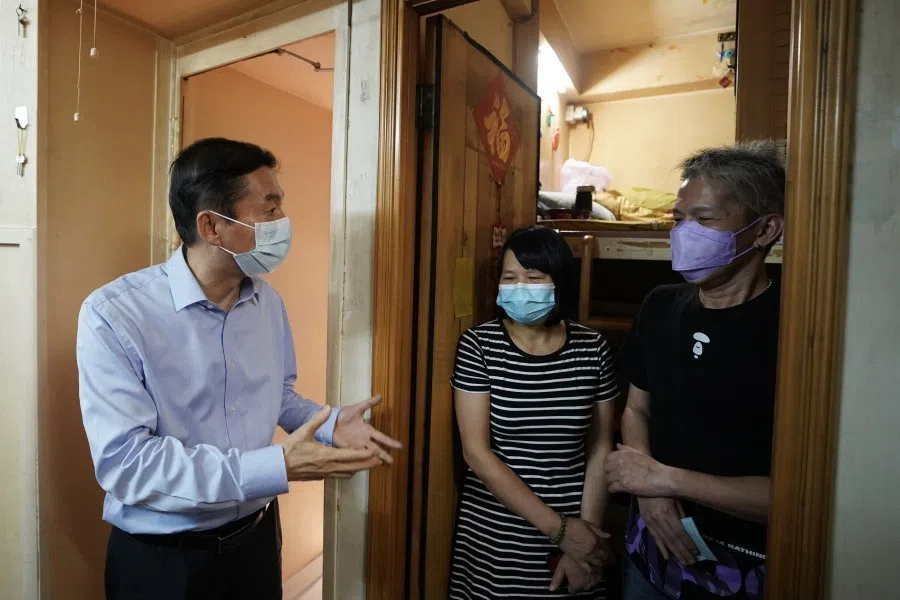
The LOCPG pointed out at the time that Luo's grassroots visits were the prelude to its efforts during the National Day period to listen to the ground and walk with one heart in unity with the people (落区聆听,同心同行). Over the following week, the LOCPG cadres went to the grassroots to understand the lives of the people and listen to them, in order to connect better with the various sectors of Hong Kong society, and be more proactive in serving the people of Hong Kong. Such activities will become the norm in future.
True enough, following Luo's grassroots visits, other LOCPG officials have been active. For days, six deputy heads and the secretary-general have visited many districts as well as sectors and industries, to get to know the lives of Hong Kongers.
Based on statistics, LOCPG officials have made at least 13 such visits between 30 September and 7 October, including those to meet young entrepreneurs, members of women organisations, and practitioners of traditional Chinese medicine. For example, deputy directors Luo Yonggang, Tan Tieniu, He Jing, and Lu Xinning have separately visited Tai O fishermen, desalination plant workers, grassroot workers, and the Hong Kong Island Women's Association.
On 5 October, a helmet-clad Tan visited the Tseung Kwan O desalination plant construction site, listening to an introduction from the contractors. During his visit, Tan spoke with ironworkers and even learnt how to do iron work from them, reminding them to be careful at all times.
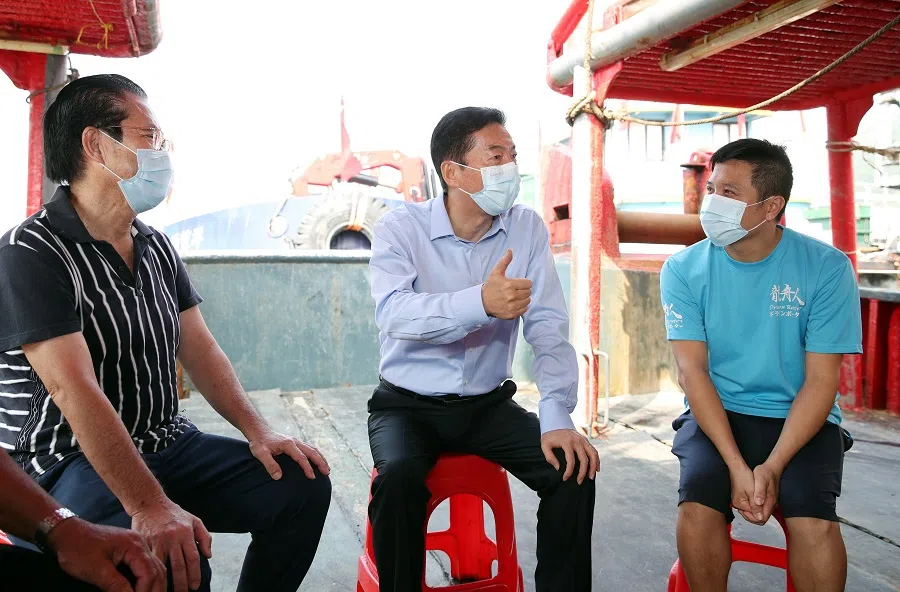
Hong Kongers visited by the LOCPG officials were deeply moved by the gesture. Sum Chi-lap, a resident of a cage home, had the opportunity to speak with Luo during his visit. When interviewed by Hong Kong newspaper Wen Wei Po, Sum said that he never thought a big shot would personally visit and speak with residents like him.
Sum described that Luo's heart was heavy after the latter witnessed the terrible living conditions of cage homes. Luo reassured him and other residents that the central government was aware of Hong Kong's housing problems and that the Hong Kong government was working hard to solve the problem as well.
Luo's words have given a confidence booster to residents like Sim who have been waiting for a public flat for 11 years, and given them hope of bidding farewell to subdivided flats and cage homes in the near future.
Mdm Lam, a resident of a subdivided flat in the Sham Shui Po area, was one of those visited by Chen Dong, a deputy director of LOCPG. She said that she had never thought that someone from the authorities would visit her, and finally felt that someone actually cared for her.
Fifty-three-year-old Mdm Lam lives alone in a small 15 square metres subdivided flat. Her husband passed away due to illness, and her children have migrated to the mainland. She has been waiting for a public flat for nine years. Two years ago, she lost her ability to work after a car accident, and has no other options but to wait for her case to be reviewed for work injury compensation. In the meantime, she lives on payouts from the Comprehensive Social Security Assistance scheme.
"This is one of the reasons why officials from the Liaison Office are visiting grassroot communities - to act as role models to Hong Kong officials so that they will no longer have an excuse not to interact with ordinary residents in various regions." - Chan Wai-keung, lecturer, The Hong Kong Polytechnic University's Hong Kong Community College
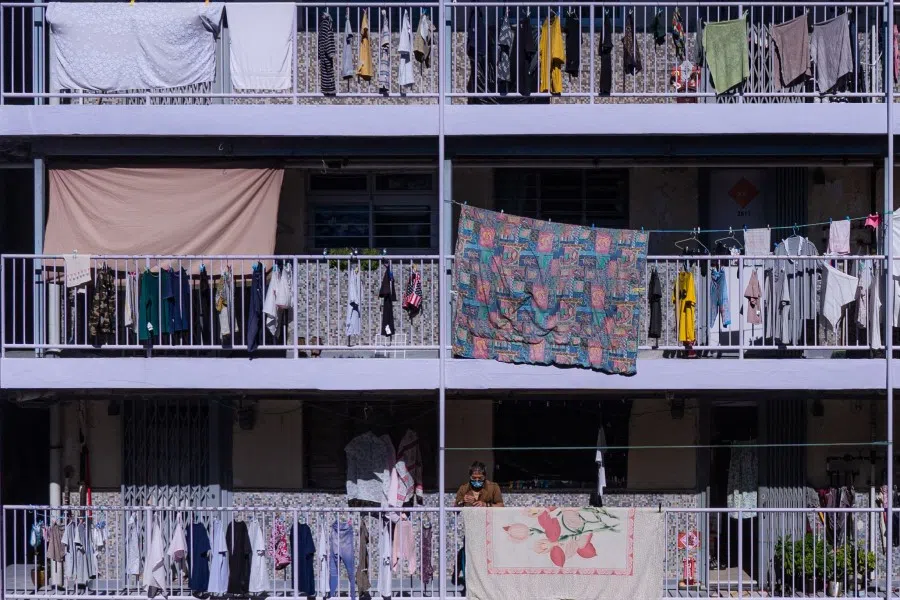
After hearing about her case, Chen conveyed that a solution would be found regardless of the magnitude of the problem. He added that the central government has always cared about the lives of ordinary Hong Kongers and will strive to solve the people's problems.
No excuses for Hong Kong officials not to do the same
Chan Wai-keung, a lecturer at The Hong Kong Polytechnic University's Hong Kong Community College, told Zaobao, "In recent years, people are starting to feel that Hong Kong officials do not have a good sense of the sentiments on the ground, and are especially afraid to interact with residents following the anti-extradition bill protest. This is one of the reasons why officials from the Liaison Office are visiting grassroot communities - to act as role models to Hong Kong officials so that they will no longer have an excuse not to interact with ordinary residents in various regions."
In fact, after LOCPG officials started visiting grassroot communities, senior officials from the Hong Kong government and various political groups of the pro-Beijing camp have followed suit. For example, in addition to promoting the consumption voucher scheme, Chan (the Finance Secretary) visited Mdm Wong at her subdivided flat on National Day, as mentioned above.
Business associations and scions also mobilised
In recent weeks, other secretaries of the Hong Kong government and members of the Legislative Council of Hong Kong (LegCo) have also visited families from various backgrounds. Just to name a few, Secretary for the Civil Service Patrick Nip Tak-kuen, Secretary for Home Affairs Caspar Tsui Ying-wai, Secretary for Financial Services and the Treasury Christopher Hui Ching-yu, Secretary for Transport and Housing Frank Chan Fan, along with LegCo members Horace Cheung Kwok-kwan, Ben Chan Han-pan, Vincent Cheng Wing-shun, Wilson Or Chong-shing, and Michael Tien Puk-sun, have made such visits.
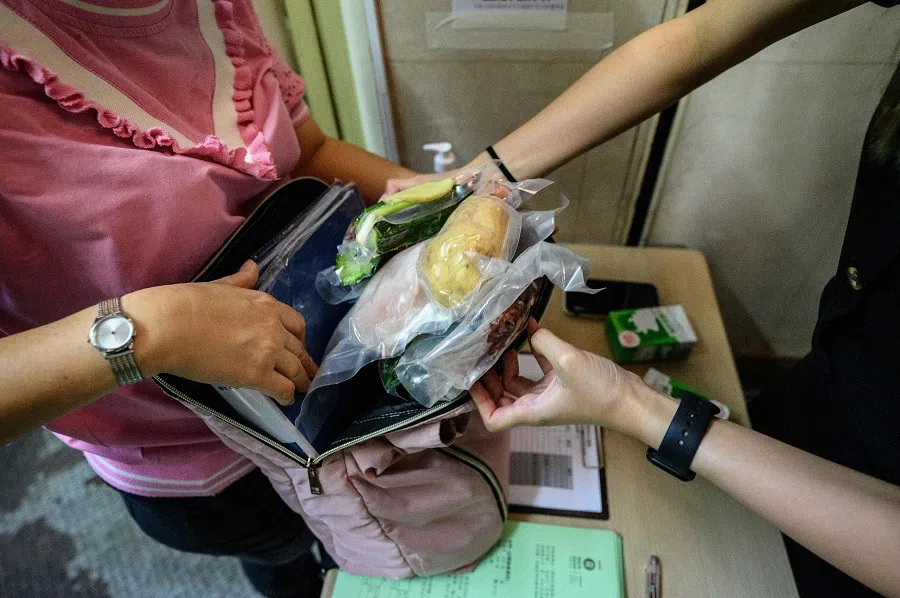
In addition to visiting grassroot communities, grassroot associations under the pro-Beijing camp have even gone one step further by serving these communities. For example, The Hong Kong Chinese Enterprises Association (HKCEA), which has around 100,000 members, launched a "serve the community" campaign on 1 October, announcing that 40 of its member enterprises would mobilise roughly 3,000 volunteers to participate in over 300 community service projects across Hong Kong. These activities are expected to benefit hundreds of thousands of grassroot citizens in Hong Kong.
The HKCEA hopes that these activities will unite Chinese-funded enterprises in actively fulfilling their social responsibilities in Hong Kong and focus on improving the lives of ordinary Hong Kong citizens. Areas of interest include welfare services, financial consultations, medical services, Greater Bay Area policies, tourism services, book donations, maintenance of indoor facilities and so on.
The Y.Elites Association, whose members are mainly scions of wealthy families, also announced that it would be collaborating with over 50 youth organisations in Hong Kong to launch a programme targeted at helping the poor and sending warmth to the grassroots (菁准扶贫,送暖到基层), which plans to visit 2,500 grassroot families in the year ahead.
The Y.Elites Association said that it would continue to help the younger generation in the future, and plans to provide free eye check-ups to 2,000 children aged between two and six, so that parents would be able to detect and correct their child's eye problems in the best window for doing so.
Wu Junfei, deputy director of Hong Kong's Tianda Institute think tank, told Zaobao that the visits made by LOCPG officials have achieved good results, and successfully implemented the Chinese Communist Party's people-centred governance ideal in Hong Kong society. "From what I saw on the news, Hong Kongers from all walks of life raised various social issues, such as housing and social mobility of the youths, to officials from the Liaison Office. They are all very grateful towards the officials and finally feel that they are cared for. This shows that such visits are effective," he said.
LOCPG officials could survey the districts in civilian clothes and perhaps travel on the Mass Transit Railway in a low-profile manner and speak with residents at the parks near public housing estates to achieve better results.
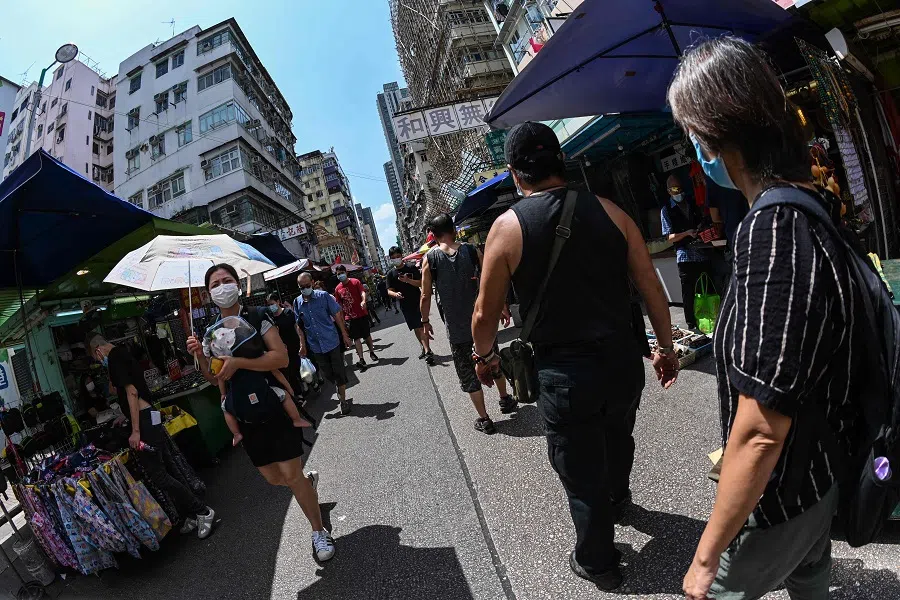
Putting up a show? Actions of pro-Beijing camp could backfire
The Hong Kong Polytechnic University's Chan Wai-keung also thinks that such visits are a good thing as it reflects that the central government cares for Hong Kongers. At the same time, central government officials stationed in Hong Kong are also able to personally witness the plight of grassroot communities in Hong Kong, and listen to their concerns.
But he also cautioned that the frequent visits by the pro-Beijing camp soon after the LOCPG visits may backfire as quite a few Hong Kongers think that members of the pro-Beijing camp are merely bootlicking and putting up a show, and not truly serving the grassroots. He cautioned, "So there cannot be too many of such visits. The most important thing is to do practical things to help the residents."
He believes that most of the families and individuals visited by LOCPG officials and the Hong Kong government were screened and singled out by the authorities. Since the majority of these selected people support the government, it would be difficult for officials to conduct in-depth investigations and listen to different opinions in the community. He suggests that in the future, LOCPG officials could survey the districts in civilian clothes and perhaps travel on the Mass Transit Railway in a low-profile manner and speak with residents at the parks near public housing estates to achieve better results.
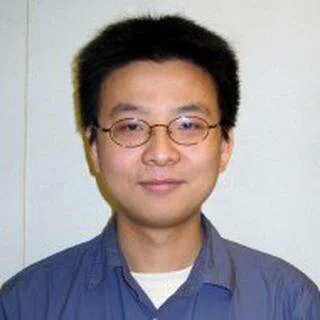

![[Big read] When the Arctic opens, what happens to Singapore?](https://cassette.sphdigital.com.sg/image/thinkchina/da65edebca34645c711c55e83e9877109b3c53847ebb1305573974651df1d13a)


